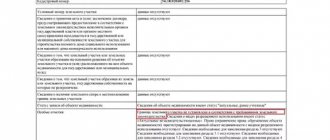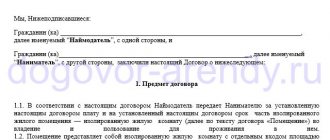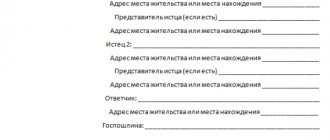A letter to extend the term of the contract is drawn up in the case where such a condition for its extension was specified in the original contract. In this case, there is no need to sign additional agreements or rewrite the terms of the initially reached agreements.
- Form and sample
- Free download
- Online viewing
- Expert tested
FILES
It is not necessary to draw up this document if the contract implies an indefinite (unlimited) period. In all other cases, when one agreement between counterparties expires, some method of extension must be applied. Otherwise, the contract will be considered terminated.
Components of a letter
The letter is ideally printed on the organization's letterhead. This way, your contact details and name will be guaranteed to be at the top of the page. If you don’t have special forms at hand, then standard A4 format, office paper, will do. It should contain the following information:
- Date the letter was written. If this is accepted in the organization, then the number.
- The addressee to whom the letter is intended. In the upper right part it is customary to write your full name and also indicate your position. Naturally, if the letter is sent to an organization.
- Who is sending the message? If it is sent on behalf of the organization, then this is its leader. It is necessary to indicate not only the full name, but also the position and full name of its leader.
- A reference to the agreement that was concluded between its parties.
- If possible, reference to the clauses of the contract, according to which the extension of the agreement occurs in this way.
- From what date to what date will the terms of the existing agreement be extended?
The letter is certified by the “autograph” of the manager or a person who has the appropriate rights to sign business documentation.
Renew or sign a new one?
People are often interested in what is better: renewing the current document or signing a new one? Opinions on this matter vary.
From the point of view of a lawyer or government official, it is best to draw up a new one . This is the easiest way to track the start and end dates of the relationship between the parties.
After all, the parties can extend the validity of the document many times; the number of additional agreements is not fixed anywhere. to carry out control, including tax control .
If we talk about saving time for the tenant and the landlord, then it is easier to renew the rental agreement. For example, the owner of the apartment will not need to return the deposit to the tenant, who will still pay it again later using a new document.
Also, at the end of the lease, you need to draw up an act of acceptance and transfer of property from the tenant to its owner. And after that, when the new agreement comes into force, another act will be drawn up to transfer the apartment and the property in it to the tenant.
In any case, the maximum duration of renting out living space cannot last more than 5 years without concluding a new title document.
Legal subtleties
When concluding contracts, special attention must be paid to deadlines. If we are talking about prolongation, then it is necessary to clarify how many times you can resort to extending the period and under what conditions. During legal proceedings, there are often cases in which counterparties have different points of view on exactly when a particular agreement expired. A letter about extending the agreement in this case will be a guarantee from the second party that the first was aware of the extension of the agreement.
An important nuance: the letter must receive a response with confirmation or refusal to extend the agreement. All parties must express their consent, only in this way the conditions will remain the same.
If the terms of the contract need to be adjusted, then it will be more convenient to draw up an additional agreement. This method is most common in our country.
The coronavirus pandemic as a basis for changing the real estate lease agreement
Among the “anti-virus” measures urgently taken by the state, almost unnoticed were the norms aimed at protecting the rights of tenants of real estate (not only state and municipal property, but also, based on the text of the norm in question, also privately owned property) .
04/01/2020, Federal Law dated 04/01/2020 N 98-FZ “On Amendments to Certain Legislative Acts of the Russian Federation on the Prevention and Response to Emergency Situations” was adopted and immediately came into force
In this bill, in addition to the “moratorium on bankruptcy” that caused a wide resonance, as well as a number of other tax and administrative measures, there is article 19 with the following content:
"1. To establish that in relation to lease agreements for real estate concluded before the adoption in 2021 by the state authority of a constituent entity of the Russian Federation in accordance with Article 11 of the Federal Law of December 21, 1994 No. 68-FZ “On the protection of the population and territories from natural and man-made emergencies” character" (as amended by this Federal Law) of a decision to introduce a high-alert regime or an emergency situation on the territory of a constituent entity of the Russian Federation, within 30 days from the date of application by the tenant of the relevant real estate object, the lessor is obliged to enter into an additional agreement providing for a deferment of payment of the rent provided for in 2021. Requirements for the conditions and terms of such a deferment are established by the Government of the Russian Federation.
2. The amount of rent under real estate lease agreements concluded before the adoption in 2021 by a government body of a constituent entity of the Russian Federation in accordance with Article 11 of the Federal Law of December 21, 1994 No. 68-FZ “On the protection of the population and territories from emergency situations of natural and man-made" (as amended by this Federal Law) decisions on the introduction of a high alert regime or an emergency situation on the territory of a constituent entity of the Russian Federation may be changed by agreement of the parties at any time during 2021.
3. The tenant under real estate lease agreements has the right to demand a reduction in rent for the period 2021 due to the impossibility of using the property associated with the adoption by a state authority of a constituent entity of the Russian Federation in accordance with Article 11 of the Federal Law of December 21, 1994 No. 68-FZ " “On the protection of the population and territories from natural and man-made emergencies” (as amended by this Federal Law) decisions on the introduction of a high alert regime or an emergency situation on the territory of a constituent entity of the Russian Federation.”
Before proceeding directly to the analysis of the stated rules, it should be noted that these provisions, based on their literal interpretation, apply to any lease agreements for real estate, including: a) both real estate in state or municipal ownership, and property owned on the right of ownership to citizens and legal entities; b) both buildings, structures, premises, other capital construction projects and their parts, as well as land plots, forest plots, subsoil plots, and other real estate of a “natural nature”. It is obvious that by virtue of clause 2 of Art. 615 of the Civil Code of the Russian Federation, these rules also apply to sublease agreements for real estate.
Further, point by point:
Clause 1 – establishes the landlord’s obligation to enter into an additional agreement to postpone the payment of rent within 30 days from the date of the tenant’s application.
The conditions and terms of such a deferment are established by the Decree of the Government of the Russian Federation by Decree of the Government of the Russian Federation dated 04/03/2020 N 439.
The right to deferment applies to real estate lease agreements concluded before the introduction of a high-alert regime in the relevant constituent entity of the Russian Federation (in Moscow - this is 03/05/2020 in accordance with Decree of the Moscow Mayor No. 12-UM, in the Moscow region - 03/13/2020 in accordance with the Resolution Governor of the Moscow Region dated March 12, 2020 No. 108-PG), and does not apply to the rental of residential premises.
Not all tenants have the right to receive a deferment (as it may seem from the wording of the law), but only organizations and individual entrepreneurs related to the most affected sectors of the economy, the list of which was approved by Decree of the Government of the Russian Federation dated April 3, 2020 No. 434:
— Air transportation, airport activities, road transportation (OKVED 49.3, 49.4, 51.1, 51.21, 52.21.21, 52.23.1);
— Culture, organization of leisure and entertainment (OKVED 90);
— Physical education and health activities and sports (OKVED 93, 96.04, 86.90.4);
— Activities of travel agencies and other organizations providing services in the field of tourism (OKVED 79);
— Hotel business (OKVED 55);
— Public catering (OKVED 56);
— Activities of additional education organizations, non-state educational institutions (OKVED 85.41, 88.91);
— Activities for organizing conferences and exhibitions (OKVED 82.3);
— Activities to provide household services to the population (repair, laundry, dry cleaning, hairdressing and beauty salon services) (OKVED 95, 96.01, 96.02)
The fact that a particular business is classified as the “most affected industries” is established based on the code of the All-Russian Classifier of Types of Economic Activities ( OKVED), indicated as of 03/01/2020. in the information of the Unified State Register of Legal Entities or Unified State Register of Individual Entrepreneurs about a specific organization or individual entrepreneur. In the absence of the specified type of activity in the information of the Unified State Register of Legal Entities or Unified State Register of Individual Entrepreneurs (this can be easily verified by ordering an extract on the official website of the Federal Tax Service of Russia egrul.nalog.ru), the right to deferment in accordance with the stated rules of law is formally absent.
At the same time, we believe that organizations and individual entrepreneurs that actually carried out these types of activities as their main activities (for example, provided hotel services, catering services, consumer services, etc.) have the right to raise before the court the question of providing them with a similar delays, based on the principle of the constitutional principle of equality of all before the law and the court (Article 19 of the Constitution of the Russian Federation, Article 1 of the Civil Code of the Russian Federation). A situation in which inaccurate or irrelevant information is entered into the Unified State Register of Legal Entities or the Unified State Register of Individual Entrepreneurs may be grounds for bringing entrepreneurs to administrative liability in the form of a one-time fine (Part 4 of Article 14.25 of the Code of Administrative Offenses of the Russian Federation - a fine of 5 to 10 thousand rubles), but not may be a reason for refusal to apply support measures provided for by law, if there is evidence of the implementation of such activities as the main one. We believe that there are good prospects for substantiating this position in the framework of a potential legal dispute.
The terms of the installment plan are as follows:
- a deferment is provided for rental payments due from the date of introduction of the high-alert regime (03/05/2020 in Moscow and 03/13/2020 in the Moscow region) and until 10/01/2020, while during the period of validity of the high-alert regime, the payment deadline of 100% is postponed rent, and after the end of this regime and until 01.10.2020. – in the amount of 50% of the rent;
- rent arrears must be paid no earlier than January 1, 2021 and no later than January 1, 2023, in stages no more than once a month, in equal payments, the amount of which does not exceed half the monthly rent under the lease agreement;
- penalties and fines for late payment of rent are not assessed;
- establishing additional payments for the right to take advantage of the deferment is not allowed;
- if the contract separately allocates fees for utility and operating expenses, then this part of the rent continues to be charged, despite the deferment, unless the landlord himself is exempt from these expenses during the pandemic.
In order to avoid a huge wave of litigation about forcing the conclusion of additional agreements (which are still unknown when they will be considered), the legislator should have provided for the tenant’s right to unilaterally change the agreement in accordance with the conditions and deferment periods established by the Government of the Russian Federation, or provide for an “automatic” change in the terms of the agreements. There is no need for a legal dispute in conditions where the lessor is absolutely obliged to sign such an additional agreement (and he actually has nothing to object to in court if the conditions and period of the deferment meet the established requirements).
At the same time, since the law does not indicate otherwise, in order to exercise the right to receive a deferment, it is necessary to send to the lessor a draft additional agreement on amendments to the lease agreement, and in case of its refusal or “silence” within 30 days, an appeal to the court with a demand on compulsion to conclude an additional agreement (in this case, it will be concluded on the basis of a court decision with a “retrospective” date - from the date of introduction of the high alert regime).
Termination of the lease agreement by the lessor due to late payment of lease payments or the accrual of penalties (penalties) for late payment of rent during the period in question (including during the period of the dispute and before the signing of the additional agreement) will be illegal.
Clause 2 - establishes the right of the parties to enter into an additional agreement on changing the rent for 2020.
To be honest, I don’t see any legal content in this norm, since even without it it is clear that, by virtue of Art. 450 of the Civil Code of the Russian Federation, the parties have the right to change the terms of agreements previously concluded by them.
Most likely, this provision is intended to have a certain “motivating” orientation (reflecting the “opinion of the party” in a difficult period), therefore it will not have a real regulatory impact on business entities.
Clause 3 is , in my opinion, the most interesting clause, which provides for the tenant’s right to demand a reduction in rent for 2021 in the event that the use of the leased property turned out to be impossible for reasons related to the high alert regime and restrictions introduced in connection with this.
This norm also represents a special norm in relation to Art. 451 Civil Code of the Russian Federation. In general, the question that deserves a separate discussion is whether anything will “remain” from Article 451 of the Civil Code of the Russian Federation in relation to rental legal relations after the adoption of the bill under consideration - that is, whether it is possible, for example, to demand changes to other terms of the lease agreement not specified in paragraph. 1 and 3 tbsp. 19 of the bill (I believe that, of course, the introduced innovations should be considered as specifying the provisions of Article 451 of the Civil Code of the Russian Federation, but not exhausting its content).
Since the law does not define any clear criteria for the “impossibility of using property,” it is on this point that one should expect the largest number of controversial situations that will inevitably result in legal proceedings.
In fact, there are two approaches to interpreting the concept of “impossibility of using property” - literal and expansive. In the first case, such property should include only those facilities that were forced to close due to a direct indication in the regulations governing the legal regime of “high alert” (for example, all facilities serving citizens, except for food stores, pharmacies, etc.). d.). In the second case, such objects should also include those that were not required to cease operations due to the restrictions introduced, but in fact could not be operated in conditions where the work of counterparties stopped, etc. (for example, construction on a rented land plot is temporarily frozen due to the transition of suppliers and contractors to “remote work,” or there was a mass illness among workers, etc.).
It is also very interesting that the law does not directly provide for the amount of rent reduction that the tenant is entitled to claim. Here, too, two interpretations are possible - for example, one can proceed from the fact that during the period of impossibility of using the object, rent should not be paid at all (I am sure that this is exactly how the norm will be perceived in practice). At the same time, the complete elimination of the obligation to pay rent is identical to the situation in which the tenant suspends the fulfillment of obligations due to the lessor’s failure to fulfill the counter-obligation to transfer the subject of the lease (Article 328 of the Civil Code of the Russian Federation). It seems that the situation of imposing restrictions due to the coronavirus cannot, in terms of the severity of the consequences for the landlord, be equated with his guilty actions in not transferring the subject of the lease (since we have the courage to assume that the landlord is not directly related to the spread of coronavirus in the Russian Federation). Force majeure circumstances eliminate the debtor's liability in the form of penalties and losses (clause 3 of Article 401 of the Civil Code of the Russian Federation), but do not terminate the fulfillment of the main obligation in the absence of grounds provided for in Art. 416 and 417 of the Civil Code of the Russian Federation (the obligation to pay rent does not apply to these).
Consequently, we can only talk about reducing the amount of rent, but to what extent it is impossible to determine in the absence of regulatory instructions (theoretically, it would be possible, with broad discretion of the court, to distribute risks between the parties, taking into account all factual circumstances and the principles of reasonableness and fairness, however in our case this is unrealistic).
Probably, precisely because of the complexity of determining the terms of the amended contract, the general consequence of “significantly changed circumstances” is the termination of the contract, and not its change, which is allowed only in exceptional cases (Clause 4 of Article 451 of the Civil Code of the Russian Federation). In these conditions, when the legislator has nevertheless given the tenant the right to demand a change in the contract, the courts, in the framework of numerous disputes that are expected on this issue, will most likely completely refuse to collect rent for the period of forced downtime.
Thus, the bill under consideration contains a number of revolutionary provisions regarding the regulation of the rights and obligations of the parties under real estate lease agreements. The actual content of the adopted norms, taking into account their high degree of uncertainty, will depend on judicial practice, which will have to find such a difficult balance between the interests of landlords and tenants.
Conditions
In order for the mutual consent of the counterparties to be a sufficient condition for the continuation of existing agreements, the main agreement must stipulate:
- Validity.
- What methods of extending the agreement exist?
- How many times can the contract be renewed (one, two, unlimited).
- How one of the parties (or both) can terminate the contract.
It is also worth considering that it is impossible to extend something that has already ended. The contract must be renewed before it is terminated.
Otherwise, there is a possibility of errors and the possibility of fraud by one of the parties.
In most cases, if there is a constructive business relationship between the parties and the terms are clearly stated, misunderstandings are eliminated.
Extension of a long-term lease agreement
If the contract was concluded for a year or more, the employer has the preemptive right to prolong it. So, the owner of the apartment must offer to extend the lease first of all to him. Only after refusal will the landlord be able to enter into an agreement with another tenant. If the apartment owner does not plan to rent out the property in the next year, he has the right not to renew the deal upon expiration. But, if during this period he enters into a new contract with another tenant, the previous tenant has the right to appeal his actions in court and receive compensation for the damage caused.
In case of long-term employment, if neither party notified the other of the desire to extend the contract and the participants did not stop fulfilling their obligations, the deal is automatically extended under the same conditions and for the same period.
After the extension of the long-term rental agreement, it must be registered again with Rosreestr, since the encumbrance of the property has continued.
Shelf life
Typically, business correspondence has a short shelf life, but this does not apply to a contract renewal letter. It must be preserved exactly as long as the contract itself is stored.
The agreement may be permanent or temporary. Can be stored for 5, 10, 75 years. This will depend on its specifics. And the letter should be attached to it and kept for as long as he does.
This point must be taken into account by the employee who is responsible for storing documentation in the organization. If a paper form of storage is implied, then it is better to seal these two documents, especially if an additional agreement on extending the validity period has not been drawn up.
Extension of short-term hire
In a short-term relationship, one of the parties must contact the other with a notification of the desire to renew the document on the same or different terms. After reaching consensus on this issue, the parties to the transaction draw up an additional agreement in writing.
It must be taken into account that if the additional agreement specifies an extension of the contract term, for example, in the wording: “the period for providing the premises is increased by 10 months” and the total period is more than a year, the lease becomes long-term. In this case, all provisions regarding long-term employment will apply to the legal relationship.
If the parties establish by means of an additional agreement a new period not exceeding 11 months, the lease remains short-term. To do this, it is necessary to indicate in the text of the agreement the beginning of the period from the moment of signing the additional agreement.
For short-term hiring, the provisions of Article 684 of the Civil Code of the Russian Federation on the preemptive right of extension and automatic prolongation do not apply. If the parties have not notified each other of their desire to continue the legal relationship or have not reached consensus on the terms, the contract is terminated due to the expiration of the period for which it was concluded.
Other changes to terms and conditions
How to formalize changes to other conditions agreed upon when renting out living space? They change in the same way - an additional agreement according to the algorithm described earlier in this article.
Only the changed items will be different.
Participants in rental relations should remember that any change in conditions is possible only by mutual agreement . No unilateral change in the terms of the lease is possible.
Sample additional agreement to the rental agreement.
The most common reasons for changing the original document are rent and living conditions .
The apartment owner is interested in maximizing income from his small business. Therefore, he will try to increase the cost of hiring , arguing that this is due to inflation or changes in the real estate market.
In some cases, owners resort to outright blackmail : they threaten to change the locks on the front doors if new conditions are not accepted.
Tenants usually ask for a reduction in rent , because during a crisis the economic situation of citizens worsens, which reduces the demand for rental housing. Or they ask for permission to move friends or relatives into the apartment.
In any case, the parties should discuss wishes and seek compromise solutions without leading the situation to conflict.
Find out from our articles what the payment for renting a residential premises includes, as well as what the tenant must pay for and how to confirm the costs of renting an apartment on a business trip.
Registration of a long-term agreement in Rosreestr
State registration of a residential lease agreement is not provided for by law, regardless of the term of the agreement; however, a restriction (encumbrance) of the ownership of residential premises arising on the basis of a rental agreement concluded for a period of at least a year is subject to registration.
An application for registration of a restriction (encumbrance) of property rights is submitted to Rosreestr no later than a month from the date of conclusion of the agreement (clause 2 of article 674 of the Civil Code of the Russian Federation; parts 2, 4, 5 of article 51 of Law N 218-FZ).








